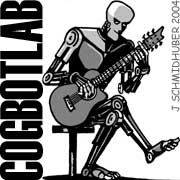MORE ON PROGRAM EVOLUTION
12.
J. Schmidhuber.
Optimal Ordered Problem Solver.
Machine Learning, 54, 211-254, 2004.
10.
J. Schmidhuber, V. Zhumatiy, M. Gagliolo. Bias-Optimal Incremental Learning of
Control Sequences for Virtual Robots. In Proceedings of the 8-th conference
on Intelligent Autonomous Systems, IAS-8, Amsterdam, 2004, in press.
11.
J. Schmidhuber.
Bias-Optimal Incremental Problem Solving.
In S. Becker, S. Thrun, K. Obermayer, eds.,
Advances in Neural Information Processing Systems 15, NIPS'15,
MIT Press, Cambridge MA, p. 1571-1578, 2003.
PDF .
HTML.
10.
R. Salustowicz and J. Schmidhuber.
Learning to predict through PIPE and automatic task decomposition.
Technical Report IDSIA-11-98, IDSIA, April 1998.
9.
R. Salustowicz and M. Wiering and J. Schmidhuber.
Learning team strategies: soccer case studies.
Machine Learning, 1998 (127 K).
8.
R. Salustowicz and J. Schmidhuber.
Evolving structured programs with hierarchical
instructions and skip nodes.
In Jude Shavlik, ed.,
Machine Learning:
Proceedings of the 15th International Conference,
p. 488-496,
Morgan Kaufmann Publishers, San Francisco, CA,
1998.
7.
J. Schmidhuber, J. Zhao, and M. Wiering.
Shifting inductive bias with success-story algorithm,
adaptive Levin search, and incremental self-improvement.
Machine Learning 28:105-130, 1997.
PDF .
Flawed HTML.
6.
R. Salustowicz and J. Schmidhuber.
Probabilistic incremental program evolution.
Evolutionary Computation, 5(2):123-141, 1997.
5.
J. Schmidhuber.
Discovering neural nets with low Kolmogorov complexity
and high generalization capability.
Neural Networks, 10(5):857-873, 1997 (123 K).
PDF
,
HTML
4.
R. Salustowicz and J. Schmidhuber.
Probabilistic incremental program evolution:
stochastic search through program space. In van Someren, M.,
Widmer, G., editors, Machine Learning: ECML-97,
Lecture Notes in Artificial Intelligence 1224,
pages 213-220, Springer, 1997.
3.
M. Wiering and J. Schmidhuber.
Solving POMDPs using Levin search and EIRA.
In L. Saitta, ed.,
Machine Learning:
Proceedings of the 13th International Conference,
pages 534-542,
Morgan Kaufmann Publishers, San Francisco, CA, 1996.
PDF .
HTML.





























